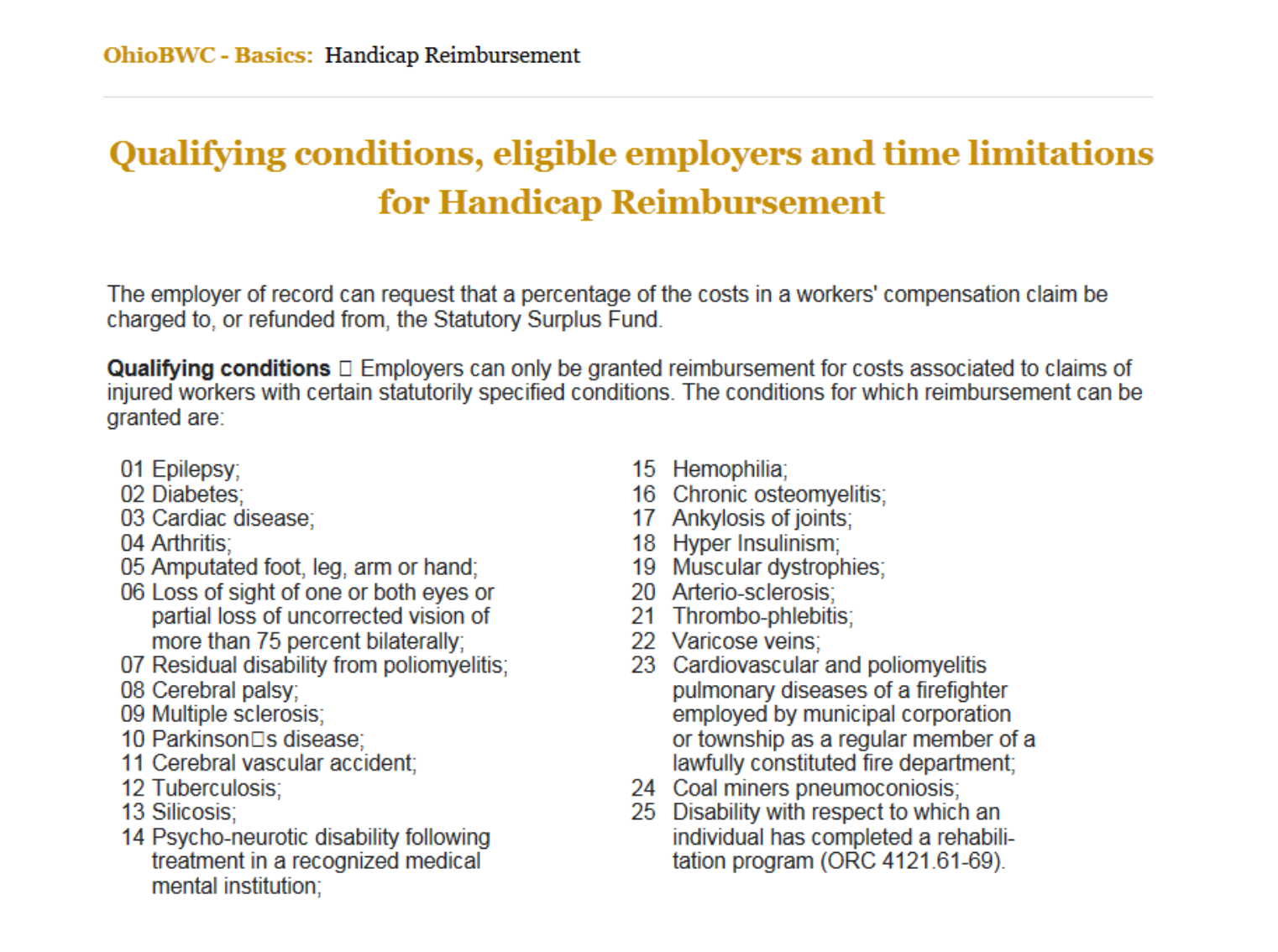Blog
What is Handicap Reimbursement and How Can it Save My Company Money on Workers Comp?

The Ohio Bureau of Workers’ Compensation (BWC) provides employers relief on their workers’ compensation premium if an injured worker has a pre-existing condition that delays their recovery following a work-related injury. The key is having an experienced company like Spooner managing the process to ensure that handicap reimbursements are identified and secured within the BWC required time frames.

The list above are the 25 pre-existing physical conditions the BWC will recognize. The top four, epilepsy, diabetes, cardiac disease, and arthritis are generally the most common ones.
How Do I Receive This Reimbursement?
In regards to handicaps and how an employer would go out and get this reimbursement, this really falls into the hands of the third-party administrator (TPA) who should evaluate every lost time claim for a handicap reimbursement.
The TPA should collect the medical evidence such as a list of pre-existing physical conditions and then get a file review from a doctor or a medical expert. After this, there is an informal hearing with the BWC’s legal operations and they'll file for that and have that hearing and then present the information with the BWC.
The Importance of a Third Party Administrator
The third-party administrator is going to be handling this and making sure all the documentation and everything is there because you do need a lot of documentation to make sure you get that reimbursement. From our experience, we have seen that most TPA's are not structured like Spooner to identify and ensure the highest possible handicap reimbursement. In fact, we've taken over for several other TPAs and identified missed handicap reimbursements as well as reimbursements that were never secured and are not outside of the window of opportunity for relief. Those TPAs left money on the table that could have been yours if they only did the work. We’ve got a handicap reimbursement team dedicated to identify and securing handicaps so this doesn’t happen for our clients.
This reimbursement is a huge benefit to the employer and something they could be missing out and if they don't know it's available.
Get Your Reimbursement
Contact Spooner today for a no-cost, no-obligation review to help identify any potential handicap reimbursements as well as a full review to identify ALL available avenues for saving on your workers’ comp related costs.

Rehashing the Complexities of Marijuana in the Workplace
Posted By Brandy King
February 02, 2026
Category: Medical Marijuana, Drugs In The Workplace, Marijuana Rescheduled, Marijuana Breathalyzer, Cannabix, Thc Breath Test
Toward the end of 2025, President Trump signed an executive order directing the U.S. Department of Justice (DOJ) to expedite the rescheduling of marijuana from Schedule I to Schedule III under the Controlled Substances Act. This is monumental in that it acknowledges that marijuana does, in fact, have valid clinical/medical uses and has low-to-moderate potential for abuse. Only four states in the U.S. still regard cannabis as being fully illegal, while another six allow only the cannabinoid CBD, which is known not to produce psychoactive effects. All other states have some version of legal or decriminalized marijuana, be it medical, recreational, or a combination of both. The first thing that’s important to note and is widely misunderstood is that this rescheduling does not legalize marijuana federally. As of January 28, 2026, Marijuana is still a Schedule I drug, since the Drug Enforcement Agency (DEA) has not yet finalized this rule. Once they do cement this change, there could be some wide-sweeping changes to drug testing. The Department of Health & Human Services (HHS) currently only allows testing for Scheduled I and II substances for federal and regulated drug-testing programs followed by DOT-regulated employees and other safety-sensitive positions. Truck drivers, pilots, transit operators, railroad employees, and pipeline workers are all currently subject to mandatory drug and alcohol testing, including marijuana. There has been talk of a
Unemployment Services with Spooner
Posted By Brandy King
February 02, 2026
Category: Ohio, Unemployment, Hr Outsourcing, Unemployment Claims, Fraud
If you haven’t considered trusting Spooner’s family of companies with managing your unemployment claims, maybe you’re not sure what it entails and how much time and hassle it could save. You may have also tried outsourcing this to another vendor in the past and found that their approach really didn’t save you much of anything. The team at Spooner Risk Control (which encompasses both Spooner Inc and SuretyHR) boasts over 15 years of experience managing unemployment claims, including an attorney that will represent your company at hearing. Many clients that are new to using our unemployment services have shared that past vendors still required them to log into their portal, submit all the responses and paperwork, then the vendor would send to the state. Our approach is to simply ask for the documentation, submit, and take care of everything. As an unemployment services client, you’d be asked to sign a third-party representation form that will allow any unemployment-related forms and letters to come directly to us so you’re not always the go-between. Here’s a run-down of the services you can expect as an Unemployment Services client: Monitor and report all new unemployment claims and notifications Submission of claims and responses after requesting information from the employer and submission of any rebuttals File and submit appeals on any base period unemployment notifications or allowed claims File appeals to the
New E-Verify Requirement for Non-Residential Construction (HB 246)
Posted By Brandy King
February 02, 2026
Category: I 9, Immigration, E Verify, Construction, Ohio Hb 246
If you weren’t paying close attention, you may have missed the passage of Ohio’s House Bill 246, or the E-Verify Workforce Integrity Act. This will require all Ohio nonresidential contractors, subcontractors, and labor brokers to confirm employees’ work eligibility through the federal E-Verify program. Nonresidential construction is defined in HB 246 as: “…The construction or renovation of any building, highway, bridge, utility, or related infrastructure, but does not include any of the following: (1) An industrialized unit, manufactured home, or a residential building as defined in section 3781.06 of the Revised Code; (2) A building or structure that is incidental to the use of the land on which the building or structure is located for agricultural purposes as defined in section 3781.06 of the Revised Code; (3) A mobile home as defined in section 4501.01 of the Revised Code.” Included employers are expected to be fully compliant with the E-Verify requirement by March 19, 2026. There are currently no exceptions being made for small businesses or sole proprietors, and E-Verify is a free service. Employers will enroll at www.e-verify.gov and create a new case for each new hire by entering info provided on their I-9 and should receive initial results in seconds. Once a final eligibility result is obtained, employers may close that employee’s case. The Act requires employers to maintain this verification record for three
Contact
28605 Ranney Parkway
Westlake, Ohio 44145
Phone: 440-249-5260 ext. 153
Hours: 8AM to 5PM

